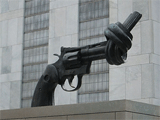Beware the Anti-Disarmament Nonsense
By Timothy Collins for Diplomatic Courier (DC)
Controversial, because according to a vocal group of Kenneth Waltz’s disciples and pro-nuke think-tankers, nuclear weapons make the world a safer place. The assumption rests on the alleged pacific effect of nuclear weapons. The absence of nuclear conflict between the U.S. and the Soviet Union during the Cold War is often cited as evidence of the peace-inducing effects of nukes. Never mind those tense 13 days in October 1962, nor the fact that the possession of nuclear weapons by the U.S. and the Soviet Union was but one among several reasons the Cold War did not heat up. The incontrovertible fact is that whatever may be said about nuclear restraint post-Hiroshima and Nagasaki, nuclear weapons are inherently destabilizing and will remain so.
Critics of the President’s desire, as articulated in his Prague speech of April 5, to slash U.S. and Russian nuclear arsenals and eventually eliminate nuclear weapons entirely, lampoon what they consider to be pie-in-the-sky idealism. But consider the alternative: the maintenance of this frighteningly unstable state of nuclear disorder.
Critics consider the disarmament ambitions held by President Obama, Russian President Dmitry Medvedev, British Prime Minister Gordon Brown, and Australian Prime Minister Kevin Rudd — not to mention the likes of Henry Kissinger, Sam Nunn, George Schultz, William Perry, Zbigniew Brzezinski, Colin Powell, Madeleine Albright, and James Baker III, to name only a handful of disarmament advocates — to be nothing more than a utopian indulgence.
But what the peddlers of pro-weapons philosophy fail to grasp is the caveat that these leaders use when discussing this most necessary policy objective. Although the preferred adjective differs from President to Prime Minister, foreign policy heavyweight to retired General, the underlying theme remains the same — the eventual, ultimate, whatever, disarmament of the world will take some time. Depressingly, it is also likely that nuclear disarmament will demand the efforts of more statesmen and women than the world can presently marshal to the cause. Nevertheless, the world’s leaders are correct in agreeing that that nuclear disarmament is worth a shot.
The pro-weapons philosophy of their opponents is rooted in flawed logic and a defeatist attitude. It fails to consider the possibility that whilst the knowledge possessed by scientists and governments the world over cannot be unlearned, it may be discarded, never to be called upon again. This, of course, will require an effort of even greater magnitude than that which propelled the Manhattan Project. Nuclear disarmament requires new ways of thinking, not lazy recourse to the passé theories of International Relations that characterize the anti-disarmament message. Encouragingly, the naysayers are well in the minority.
Obama, Medvedev, and Brown have already indicated their determination to vigorously pursue nuclear non-proliferation and disarmament. What is desperately needed now is a broad consensus on the matter that will pave the way for a new treaty that, in Obama’s words, “verifiably ends the production of fissile materials intended for use in state nuclear weapons.”
The stakes are huge. It would not be an exaggeration to suggest that the fate of the world may well hang on President Obama’s gambit of exchanging substantial arsenal reductions for greater global efforts to counter nuclear proliferation. As British Foreign Secretary, David Miliband, writing in The Guardian (September 20) said, "Get it right, and we will increase global security, pave the way for a world without nuclear weapons, and improve access to affordable, safe and dependable energy — vital to tackle climate change.”
The consequences of getting it wrong are all too imaginable — the ultimate death of the NPT regime, greater nuclear proliferation, and the increasing likelihood of nuclear war.
But if nuclear weapons are, as the anti-disarmament crowd proclaims, a good thing, then perhaps all this urgent diplomacy is much ado about nothing. The U.S., Russia, Britain, France, and China are all more secure thanks to their nukes. The subcontinent is undoubtedly a more tranquil place thanks to Indian and Pakistani nuclear weapons. The Korean peninsula is that much better off now that Kim Jong Il has an arsenal all his own to play with. And so too would Iran be a happier and more secure place if President Ahmadinejad got his act together and weaponized his country’s nuclear technology. Now if only we could get Bahrain, Saudi Arabia, Syria, Jordan, Yemen, Lebanon, Algeria, Morocco, and the other states of the Middle East to go nuclear, then that hotbed of centuries old tribal, religious, and political disagreements would be rendered peaceful. Or, not.
The thing is, nuclear weapons are inherently destabilizing and, as the world has witnessed many times over, their possession by certain states will lead to their acquisition by others. This alone — what former UNSCOM head Richard Butler termed the axiom of proliferation — is enough to discredit the logic of the anti-disarmament, pro-weapons crowd. For as the number of nuclear weapons states increases, so too does the likelihood that these most appalling weapons will be used.

